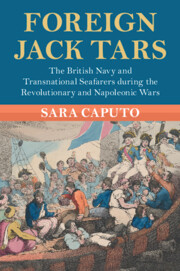 Foreign Jack Tars
Foreign Jack Tars Alien Seamen, Subjecthood, and the Navy
from Part I - The State
Published online by Cambridge University Press: 03 November 2022
Chapter 2 looks at seamen who were ‘aliens’ (non-subjects), and shows that legal distinctions ultimately mattered little to the Navy. Britain was rather open to immigration, and during wartime most residual disabilities of non-subjects were eased for common sailors, who were needed and overall welcome. At the same time, military necessity meant that any advantages which their status as subjects of a different sovereign should have afforded them, most notably protection from impressment (forced service), were often ignored in practice. In courts martial, special accommodations and concessions were granted informally, as a result of perceived cultural ignorance, rather than on the basis of legal status. Finally, naturalisation was liberally bestowed on naval seamen, but it was, this chapter argues, a largely irrelevant benefit. The state was very quick to revoke its protection if this clashed with native allegiances, and during wartime the alien sailor, already allowed to work in both the Navy and merchant vessels, did not stand to gain much from being naturalised. If individual seamen strategically navigated legal status and national allegiances, so did the state itself: when in need of manpower, it did not hesitate to treat its own legal categories and subjecthood boundaries as pliable.
To save this book to your Kindle, first ensure [email protected] is added to your Approved Personal Document E-mail List under your Personal Document Settings on the Manage Your Content and Devices page of your Amazon account. Then enter the ‘name’ part of your Kindle email address below. Find out more about saving to your Kindle.
Note you can select to save to either the @free.kindle.com or @kindle.com variations. ‘@free.kindle.com’ emails are free but can only be saved to your device when it is connected to wi-fi. ‘@kindle.com’ emails can be delivered even when you are not connected to wi-fi, but note that service fees apply.
Find out more about the Kindle Personal Document Service.
To save content items to your account, please confirm that you agree to abide by our usage policies. If this is the first time you use this feature, you will be asked to authorise Cambridge Core to connect with your account. Find out more about saving content to Dropbox.
To save content items to your account, please confirm that you agree to abide by our usage policies. If this is the first time you use this feature, you will be asked to authorise Cambridge Core to connect with your account. Find out more about saving content to Google Drive.